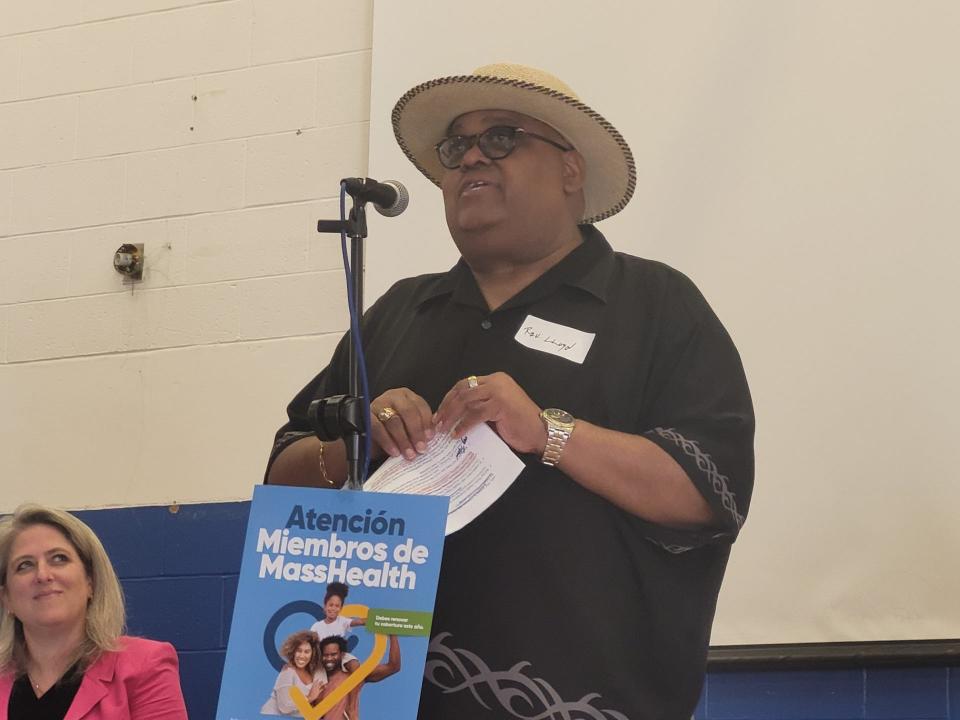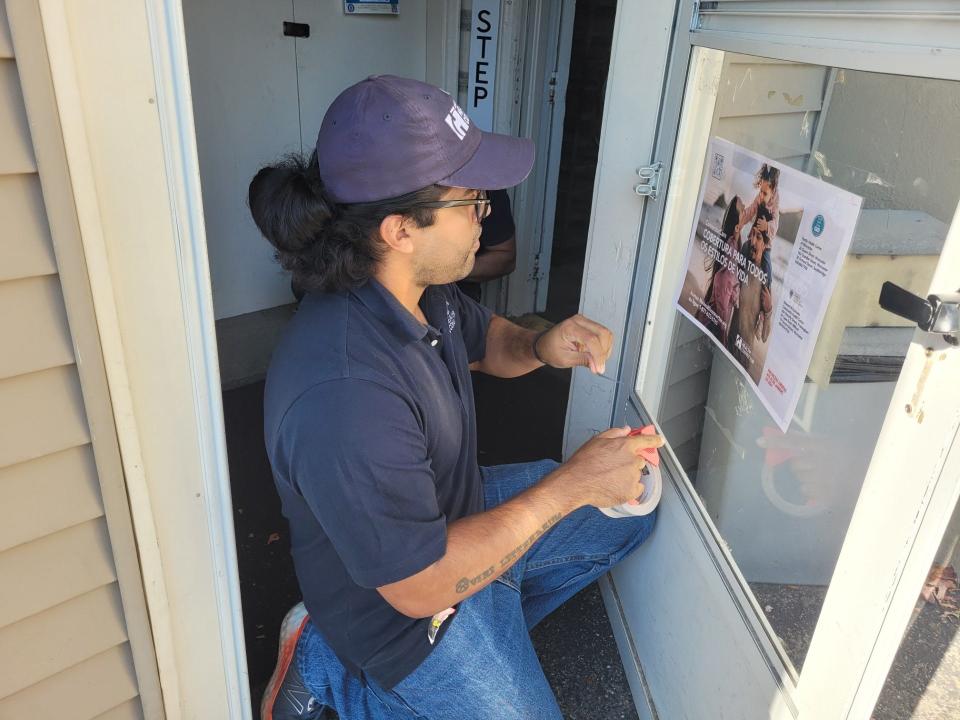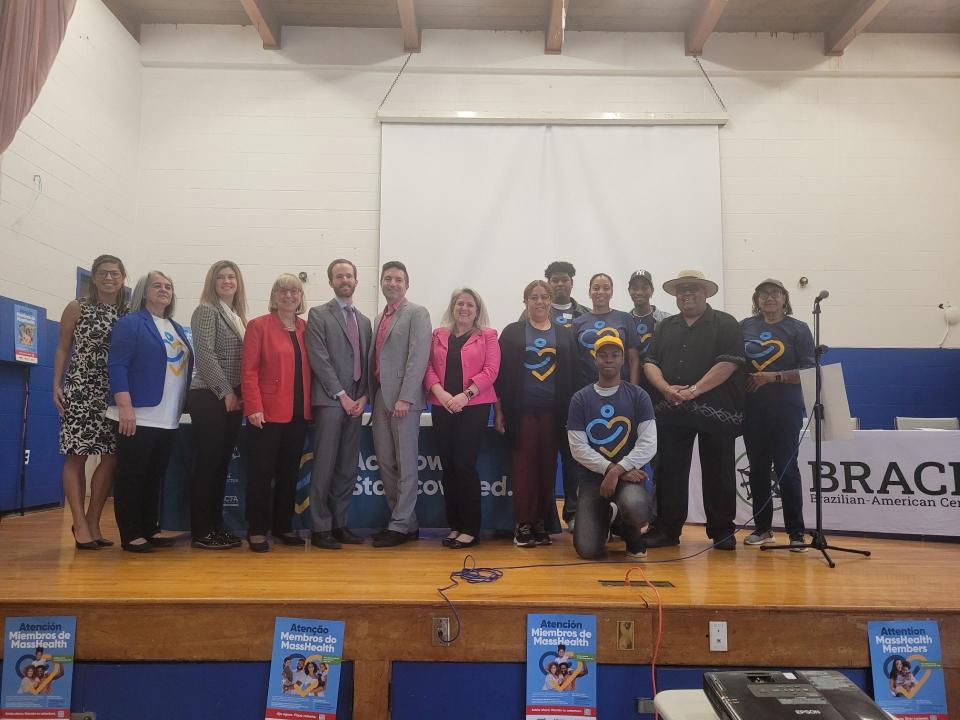Mass. Health Connector workers visit Framingham businesses to inform them of insurance
FRAMINGHAM — The Rev. Dr. J. Anthony Lloyd remembers when COVID-19 vaccines were first distributed to the public. They were given out at several sites, one of which was Lloyd's Greater Framingham Community Church on Franklin Street.
"I remember being on the front steps of the church and people wondering if they would be able to get a vaccine," he said. "I remember one woman looking at me and asking if she could really get the vaccine for free. It grabbed me, the context of where you felt so helpless — and yet my responsibility was to be a sense of hope."

'It's important, and needed': Teens' door-to-door efforts aim to bring vaccine equity to Framingham
The high cost of medical care puts extreme stress on residents, particularly those who are uninsured. Roughly 5% of Framingham's population goes without insurance, more than double the state average. But over the next several months, the state is pushing to help uninsured or underinsured residents find coverage through Massachusetts Health Connector — a service that aims to offer affordable health plans for people who lost their insurance.
Framingham has high number of residents without health insurance
Framingham has been earmarked by the Health Connector as a high-priority community due to its high number of residents without health insurance. And because of changes in MassHealth policy coming out of the pandemic, even more people are expected to be uninsured.
Audrey Morse Gasteier, executive director for the Health Connector, was in Framingham on Wednesday to discuss the need to publicize the options available to the uninsured. Open enrollment for the Health Connector begins Nov. 1 and runs through Jan. 23, with the goal of getting as many people signed up to the service as possible.
Earlier: State's version of Medicaid is redetermining the eligibility of every member
Morse Gasteier said this season there is a particular public information push. During the pandemic, residents enrolled in MassHealth — Massachusetts' version of the Medicaid program — were permitted to remain there, even if they no longer met standard requirements. This was a common scenario for people who lost their jobs at the start of the pandemic, but had since found another position.
But that unilateral service is coming to an end, meaning that many people who currently have MassHealth will no longer be eligible.
"The state is going through a MassHealth redetermination process, which started back in April and will be going through the spring, and that is a process where MassHealth is checking the eligibility of every single person who is on MassHealth coverage, which is about one out of every three people in the state," Morse Gasteier said. "We know there are going to be a lot of people who are going to lose their health coverage."
Morse Gasteier said the Health Connector is the next stop for those who can no longer get coverage through MassHealth, and that most people who qualify for the Health Connector also qualify for help paying for insurance.
"So there are a lot of affordable options," she said.
The Health Connector is expanding its qualifications for subsidized health care plans, expanding the age range for eligible clients as well as raising income limits, in hopes of getting more people insured.
"The coverage that is offered through the Health Connector is commercial, private insurance, but there are subsidies attached to it, to help people who are of low and moderate income," Morse Gasteier said.
Local teams canvassing Framingham to encourage sign-ups
With the open enrollment period beginning, the Health Connector has visited high-priority communities to help local residents understand their health insurance options. On Wednesday, a team of Health Connector workers canvassed Waverly Street in Framingham, talking to small business owners and placing signs in business windows with information about how to get enrolled in the program.
"We love to go business-to-business, adding that personal touch and making sure that people have the right information," said Oscar Lopez, one of the team members. "By posting the signs in businesses, we are connecting ourselves to the local small businesses in the community,"

Lopez and others marched up and down Waverly Street, talking to employees and small business owners about the program. They placed signs and provided information on how to get in touch with state health care officials if customers have questions.
Lopez speaks Spanish, while another member of the team, Fabiano Latham, speaks Portuguese, allowing the team to better connect with residents of different ethnic backgrounds, many of whom are uninsured at disproportionately higher rates.
"Especially for people in Framingham, there are a lot of Portuguese speakers, and the language is a barrier, people don't understand our health care information," said Latham, who is originally from Sao Paulo, Brazil. "Me personally, I like to tell people, 'Let me help you,' and explain how it works. You engage people much faster by speaking their language and to help people understand why this is important."
Margie Ann Rosario, a canvassing lead who is director of Voices of the Community, a Framingham organization that empowers youth to leadership positions, said that by having local people who can relate to the demographics the Health Connector is targeting, the program stands a much better chance of getting a positive message out to residents who need it most.
'Makes a difference': Why MetroWest Free Medical Program's new Marlborough clinic matters
"Conversation is really important," Rosario said. "Being able to engage and have that conversation, being able to remove any doubt or confusion or fear. People might not feel comfortable having a conversation on this topic with just anybody. Our team lives in our neighborhoods, they intersect in everything from language to culture to background, we are young adults and young people. People can see our team waiting at the same bus stops and working in the same places."
The Health Connector also has two local "navigators," groups that residents can visit or contact if they have further questions about getting enrolled. The local navigators are the Edward M. Kennedy Community Health Center on Waverly Street and the Massachusetts Alliance of Portuguese Speakers on Union Street.
"Now is the time to re-up, now is the time to sign back up, it is not at the point when you suddenly need medical care, and show up at our emergency rooms or wherever and they tell you that your insurance is not valid," Lloyd said.
Spilka speaks on program, persciption bill
State Senate President Karen Spilka attended a press conference following the canvassing at the Brazilian-American Center on Waverly Street. She said the grassroots efforts to get people informed about health care options has been a success, and the state will look to utilize that policy when it needs to contact residents it struggles to reach.

"Anything we can do with getting people connected with affordable health care is worthwhile," said Spilka, D-Ashland. "This whole process has been very successful going with a grassroot effort, going to meetings and working with the local faith communities. It has really been successful, and looking at this model we are looking at if it can be translated to other models."
Spilka said the state Senate recently passed a bill that targets reducing the co-pay residents face while paying for prescription drugs that treat illnesses such as asthma and high blood pressure, which impacts lower-income residents at a higher rate.
"It's so important we are taking that back again, and cutting back on co-pays in chronic diseases that impact lower-income people at a higher rate," she said. "We are hoping this time the House takes it up. We are looking at prescription drugs and health equity aspects of (our medical care system) and there are a few areas of health care reform we will being taking a look at. The federal government recently passed a prescription drug law, but that was still only for people who are on Medicaid, we are trying to bring that to people on commercial insurance."
This article originally appeared on MetroWest Daily News: Health Connector connects uninsured Framingham residents with coverage

